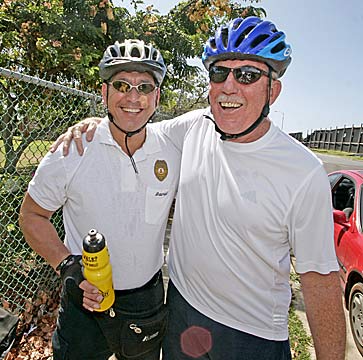
|
‘Destiny’ smiles
on cyclist
A close call helps an athlete learn
some lessons of the heart
Donald McGough lay unconscious on a Hawaii Kai roadway after having passed out during the Century Bike Ride last year.
But a stranger stopped to give him a precious gift -- the breath of life.
Today the 55-year-old McGough and the former stranger who saved his life will ride again. And this time, they hope to complete the 25-mile route.
Last Sept. 26, McGough was 14 1/2 miles into the 25-mile round-trip ride from Kapiolani Park to Sandy Beach and had no idea anything was wrong.
But suddenly McGough passed out and fell off his bike near the corner of Hawaii Kai Drive and Kealahou Street. His riding partner called 911, and a police officer arrived and began chest compression.
Ride participant David Kikau and his group of fellow Queen's Medical Center employees had stopped at the top of a hill to wait for someone who had fallen behind.
Kikau noticed a large backup of bikes and saw a police officer giving chest compression.
"He noticed people around, but nobody was giving me breath, so he decided to stop," McGough said.
Kikau, a Red Cross instructor in cardiopulmonary resuscitation, first aid and automated external defibrillator, immediately sprang into action. He got out his breathing mask and gloves, checked McGough's pulse and began rescue breaths while the officer continued chest compression.
Kikau paused to check his pulse but couldn't get one. Another police officer arrived with an automated external defibrillator.
Kikau administered two shocks and McGough began coughing.
All McGough remembers was riding along, then waking up and being told he was in the hospital.
McGough met Kikau when he came to visit him in the hospital. After his release, McGough invited the man who saved his life to his home to explain what happened after he blacked out.
"Every day I wake up and enjoy life I'll always be grateful to him," McGough said. "He's a special person."
"I didn't realize until afterwards ... that once the heart stops, you have six to eight minutes to breathe again or chances are you'll be brain dead," he said, which has made him even more grateful.
McGough, a Pearl Harbor Naval Shipyard deputy project superintendent who oversees submarine overhauls, learned he had arrhythmia -- an irregular heartbeat. Two days later, he underwent a double-bypass surgery and that same week had a cardio defibrillator implanted.
The 45-year-old Kikau, a former combat medic and lifeguard, remembers thinking how healthy McGough looked, with a thin, muscular physique and fairly developed chest muscles, unlike many of those he's worked on in the past who have been obese or old.
The ordeal left McGough dejected.
"At first I was down and out because I didn't know what the future held," McGough said. "But you just have to get through that and be positive and put up some goals and go for it."
"Now I have a whole new outlook on life," he said. "I don't let too many things bother me."
Today, the 55-year-old Pearl City man is fitter than ever, riding 50 to 60 miles a week and has done 25-mile stretches.
McGough's learned a few lessons.
One is that you never know what could happen, no matter how healthy you are.
He tells friends to take care of themselves, which he practices by watching his blood pressure and cholesterol, getting regular doctor checkups, eating a heart-healthy diet, eating less fat and sugar, and bicycling and golfing.
He also believes the portable defibrillator helped save his life and would like to see more available to save many others.
"If you wait for the paramedics, it might have been too late," he said. "When you look at the price of a human life, what's the cost of a defibrillator?"
Kikau believes it was destiny that he had stopped long enough to notice McGough needed help because ordinarily in a bike race "we never stop."
"I felt like it was meant to be, that we were in the right place at the right time for the right reason," Kikau said.
He encourages everyone to learn CPR, how to recognize an emergency and how to prevent one.
E-mail to City Desk
[News] [Business] [Features] [Sports] [Editorial] [Do It Electric!]
[Classified Ads] [Search] [Subscribe] [Info] [Letter to Editor]
[Feedback]
